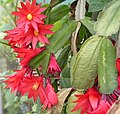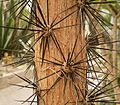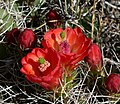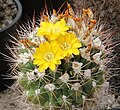The Cactaceae is a monograph on plants of the cactus family written by the American botanists Nathaniel Lord Britton and Joseph Nelson Rose and published...
8 KB (830 words) - 03:35, 20 August 2024
Succulent Plant Study set up a working party, now called the International Cactaceae Systematics Group, to produce a consensus classification of the cactus...
51 KB (2,644 words) - 19:43, 16 July 2024
truncata, the false Christmas cactus, is a species of plant in the family Cactaceae. Because it produces a flower, it also belongs to the taxonomic group...
11 KB (1,324 words) - 05:15, 16 December 2024
leaf" in Greek) is a genus of epiphytic plants in the cactus family (Cactaceae), native to Central America and South America. Common names for these...
6 KB (379 words) - 21:41, 11 October 2024
Caryophyllales comprising the families Anacampserotaceae, Basellaceae, Cactaceae (cacti), Didiereaceae, Halophytaceae, Montiaceae, Portulacaceae, and Talinaceae...
2 KB (127 words) - 21:08, 25 November 2024
eruca, commonly known as the creeping devil, is a member of the family Cactaceae. It is one of the most distinctive cacti, a member of the relatively small...
4 KB (516 words) - 01:56, 20 November 2024
largest subfamily of the cactus family, Cactaceae, and are widely distributed throughout the Americas. Cactaceae is the 5th most endangered plant or animal...
7 KB (480 words) - 10:59, 13 September 2024
Rhipsalidopsis is a small genus of flowering plant in the family Cactaceae, native to southern Brazil. Like other members of the tribe Rhipsalideae, its...
5 KB (387 words) - 02:05, 29 July 2024
within the tribe Opuntieae of the subfamily Opuntioideae, in the family Cactaceae. Species of Opuntia currently accepted, with approximate native ranges...
25 KB (91 words) - 06:48, 2 August 2024
and are very difficult to remove from the skin. The cactus family, the Cactaceae, evolved 30–40 million years ago in the Americas, originally completely...
5 KB (586 words) - 03:44, 1 April 2024
Pfeiffera is a genus of flowering plants in the family Cactaceae, found in Bolivia and northwest Argentina. There is some debate about the circumscription...
3 KB (187 words) - 03:06, 8 November 2023
A. (2012), "A New Subgeneric Classification of Rhipsalis (Cactoideae, Cactaceae)", Systematic Botany, 37 (4): 983–988, doi:10.1600/036364412X656455, S2CID 84206266...
20 KB (849 words) - 21:08, 30 July 2024
terete or triangular. In the 1994 classification of the International Cactaceae Systematics Group of the International Organization for Succulent Plant...
5 KB (472 words) - 14:00, 7 November 2023
Pilosocereus pachycladus is a species of flowering plant in the family Cactaceae found in eastern Brazil, and introduced to the Canary Islands. Pilosocereus...
1 KB (58 words) - 21:18, 5 December 2023
Stenocereus griseus (Cactaceae) en la Alta Guajira colombiana [Usage, Management and Conservation of yosú, Stenocereus griseus (Cactaceae), in the Upper Guajira...
4 KB (498 words) - 04:25, 3 January 2024
Sofía (2012), "A New Taxonomic Treatment of the Genus Trichocereus (Cactaceae) in Chile", Haseltonia, 18: 116–139, doi:10.2985/026.018.0114 Salm-Reifferscheidt...
14 KB (1,312 words) - 07:33, 25 May 2024
Rebutia is a genus of flowering plants in the family Cactaceae, native to Bolivia and Argentina. The limits of the genus have varied widely, depending...
12 KB (1,012 words) - 12:51, 20 December 2024
Opuntioideae is a subfamily of the cactus family, Cactaceae. It contains 15 genera divided into five tribes. The subfamily encompasses roughly 220–250...
9 KB (969 words) - 22:40, 3 December 2023
Ancistrocladaceae family Asteropeiaceae family Barbeuiaceae family Basellaceae family Cactaceae family Caryophyllaceae family Didiereaceae family Dioncophyllaceae family...
13 KB (1,148 words) - 14:43, 18 December 2024
Pereskia (category Cactaceae genera)
Pereskia as then circumscribed (Pereskia sensu lato) was basal within the Cactaceae, and confirmed earlier suggestions that it was paraphyletic, i.e. did...
15 KB (1,355 words) - 16:55, 30 May 2024
genus in the tribe Echinocereeae within the subfamily Cactoideae of the Cactaceae family. The Cactoideae can be further divided into two sister clades,...
26 KB (886 words) - 20:17, 7 December 2024
treated as a species, or as a variety of Opuntia polyacantha, in the family Cactaceae, that is a distributed throughout the Mojave and into the southern Great...
1 KB (113 words) - 08:34, 7 January 2024
phylogenetics and a revised suprageneric classification of the family Cactaceae", Schumannia, 6: 109–149, doi:10.5167/uzh-43285 Zuloaga, Fernando O.;...
2 KB (121 words) - 15:05, 17 February 2023
fruit of the genus Selenicereus (formerly Hylocereus), both in the family Cactaceae. The common name in English – dragon fruit – derives from the leather-like...
18 KB (1,929 words) - 08:25, 17 December 2024
Weingartia is a genus in the family Cactaceae, with species native to Bolivia and Argentina. It was formerly included in Rebutia, but molecular phylogenetic...
9 KB (518 words) - 09:56, 21 December 2024
Lohmann, Lúcia G. (2011-03-01), "Molecular phylogeny of tribe Rhipsalideae (Cactaceae) and taxonomic implications for Schlumbergera and Hatiora", Molecular...
38 KB (4,021 words) - 21:41, 11 October 2024
Gymnocalycium anisitsii is a globular cactus belonging to the family Cactaceae. The specific epithet honors the Hungarian pharmacist Dániel Anisits J...
4 KB (364 words) - 02:06, 9 December 2024
Copiapoa is a genus of flowering plants in the cactus family Cactaceae, from the dry coastal deserts, particularly the Atacama Desert, of northern Chile...
9 KB (447 words) - 05:34, 2 November 2024
macrophylla Epiphyllum oxypetalum ("night-blooming cereus") from the Cactaceae Monotropa hypopitys (also known as yellow bird's-nest or pinesap) from...
524 bytes (97 words) - 03:56, 28 August 2023



























